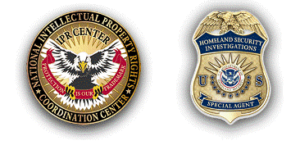U.S. Immigration and Customs Enforcement’s (ICE) Homeland Security Investigations (HSI), law enforcement agencies from Belgium, Denmark, France, Romania and the United Kingdom, and the European Police Office (Europol) seized 132 domain names today that were illegally selling counterfeit merchandise online to unsuspecting consumers.
The 132 domain names seized are part of Project Cyber Monday 3 and Project Transatlantic. These websites were set up to dupe consumers into unknowingly buying counterfeit goods as part of the holiday shopping season. The operation was coordinated by the ICE HSI-led National Intellectual Property Rights Coordination Center (IPR Center) in Washington, D.C.
This is the third year that the IPR Center has targeted websites selling counterfeit products online in conjunction with Cyber Monday. An iteration of Operation In Our Sites (IOS), Cyber Monday 3 seized 101 websites and yielded one arrest. Additionally, recognizing the global nature of Internet crime, this year the IPR Center partnered with Europol, who, through its member countries, executed coordinated seizures of foreign-based top-level domains such as .eu, .be, .dk, .fr, .ro and .uk. This effort is titled Project Transatlantic and resulted in 31 domain name seizures.
“This operation is a great example of the tremendous cooperation between ICE and our international partners at the IPR Center,” said ICE Director John Morton. “Our partnerships enable us to go after criminals who are duping unsuspecting shoppers all over the world. This is not an American problem, it is a global one and it is a fight we must win.”
The IPR Center and Europol received leads from various trademark holders regarding the infringing websites. Those leads were disseminated to eight investigating HSI field offices in Baltimore, Buffalo, Denver, El Paso, Newark, San Antonio, San Diego, and Ventura (Calif.) and to the investigating Europol member countries including Belgium, Denmark, France, Romania and the United Kingdom.
“Europol became a member of the IPR Center this year and I am glad to be able to announce these operational successes,” said Rob Wainwright, Director of Europol. “IPR theft is not a harmless and victimless crime. It can cause serious health and safety risks and it undermines our economy.”
The domain names seized are now in the custody of the governments involved in these operations. Visitors typing those domain names into their Web browsers will now find a banner that notifies them of the seizure and educates them about the federal crime of willful copyright infringement.
In addition to the domain name seizures, officials identified PayPal accounts utilized by the infringing websites. Proceeds received through the identified PayPal accounts, in excess of $175,000, are currently being targeted for seizure by the investigating HSI field offices.
“We couldn’t be more pleased with the opportunity to work closely with HSI to shut down criminals targeting our customers and our brand just as the holiday season takes off,” said Tod Cohen, Vice President and Deputy General Counsel of Government Relations for eBay Inc. “PayPal and eBay Inc. pride ourselves in going above and beyond in the fight against the illegal online trafficking of counterfeit goods by partnering with law enforcement and rights owners globally, and we hope that this is fair warning to criminals that the Internet is not a safe place to try and sell fake goods.”
During this operation, federal law enforcement officers made undercover purchases of a host of products; including professional sports jerseys, DVD sets, and a variety of clothing, jewelry and luxury goods from online retailers who were suspected of selling counterfeit products. If the copyright holders confirmed that the purchased products were counterfeit or otherwise illegal, seizure orders for the domain names of the websites that sold these goods were obtained from federal magistrate judges.
IOS is a sustained law enforcement initiative that began more than two years ago to protect consumers by targeting the sale of counterfeit merchandise on the Internet. The 101 domain names seized under Project Cyber Monday 3 bring the total number of IOS domain names seized to 1,630 since the operation began in June 2010. Since that time, the seizure banner has received more than 110 million individual views.
Of the 1,529 previous domain names seized, 684 have now been forfeited to the U.S. government. The federal forfeiture process affords individuals who have an interest in seized domain names a period of time after a “Notice of Seizure” to file a petition with a federal court and additional time after a “Notice of Forfeiture” to contest the forfeiture. If no petitions or claims are filed, the domain names become the property of the U.S. government. Additionally, a public service announcement, launched in April 2011, is linked from the seizure banner on each of the 684 forfeited websites.
The banner and video educate the public about the criminal consequences of trafficking in counterfeit goods and the economic impact that crime has on the U.S. and global economies.
U.S. Attorney’s Offices in the Districts of Maryland, Colorado, New Jersey, Southern District of California, Central District of California, Western District of New York, and the Western District of Texas issued the warrants for the seizures. Significant assistance was provided by the Department of Justice’s Computer Crime and Intellectual Property Section.
The IPR Center is one of the U.S. government’s key weapons in the fight against counterfeiting and piracy. Working in close coordination with the Department of Justice Task Force on Intellectual Property, the IPR Center uses the expertise of its 21 member agencies to share information, develop initiatives, coordinate enforcement actions, and conduct investigations related to IP theft. Through this strategic interagency partnership, the IPR Center protects the public’s health and safety, the U.S. economy and the war fighters.
To report IP theft or to learn more about the IPR Center, visit www.IPRCenter.gov.
SOURCE: ICE



